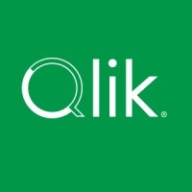
![Talend Open Studio [EOL] Logo](https://images.peerspot.com/image/upload/c_scale,dpr_3.0,f_auto,q_100,w_64/bceq7xfg24vcset503xm0hyyr88r.jpg?_a=BACAGSGT)
Talend Open Studio and Qlik Compose compete in the ETL tools category. Talend has the upper hand in flexibility and connectivity due to its extensive component library and open-source nature, while Qlik Compose excels in automation and ease of warehouse creation.
Features:Talend Open Studio provides a robust data integration platform with over 900 components, offering extensive connectivity options, particularly for smaller companies requiring varied data handling without custom setups. Qlik Compose provides powerful automation for data warehousing, with capabilities for data modeling and real-time replication, presenting a streamlined interface for warehouse creation.
Room for Improvement:Talend Open Studio needs better performance, reduced resource consumption, and improved enterprise licensing costs. It also requires enhanced technical support and more comprehensive online resources. Qlik Compose needs better processing of large data volumes, more self-service capabilities, and improved integration with complex data sources.
Ease of Deployment and Customer Service:Talend Open Studio, deployed mainly on-premises, offers private and public cloud options, with community-driven technical support. Qlik Compose, also primarily on-premises with cloud options, has structured assistance requirements but experiences less responsive support in complex scenarios.
Pricing and ROI:Talend Open Studio's open-source option offers upfront cost savings, although its enterprise version can be expensive. It provides high ROI through reduced development time. Qlik Compose's licensing is pricey, influenced by data usage, but offers substantial ROI due to efficient deployment and data handling in large-scale implementations.


| Company Size | Count |
|---|---|
| Small Business | 3 |
| Midsize Enterprise | 3 |
| Large Enterprise | 6 |
| Company Size | Count |
|---|---|
| Small Business | 22 |
| Midsize Enterprise | 13 |
| Large Enterprise | 18 |
Qlik Sense is a powerful business intelligence tool that offers a range of features to help organizations make faster and more informed decisions. Its primary use cases include operational and financial dashboards, self-service reporting, and centralized access to cross-functional reports. The solution is praised for its mobile platform, ease of use, data-sharing capabilities, and extensibility.
Qlik Sense has helped organizations improve data literacy, reduce time consumed in complex reports, and provide widely available MI to senior stakeholders. It also enables self-service analytics, improves data quality and governance, enhances collaboration, and reduces costs.
Talend Open Studio [EOL] is a user-friendly data integration tool that offers comprehensive ETL capabilities with extensive connector options. Its open-source nature and integration with a range of data sources make it a versatile choice for data integration tasks.
Talend Open Studio [EOL] provides flexibility and scalability for data integration by supporting relational and NoSQL databases. It is Java-based, allowing customization and data quality features, backed by community support. Challenges include limitations in scheduling and monitoring, technical support, resource consumption, and version control. The complex installation process and need for better documentation and easier use for beginners are notable issues. Despite these, it remains a strong option for connecting legacy applications, building data warehouses, and automating processes with data migration, synchronization, transformation, and loading from ERP systems, APIs, and databases like PostgreSQL, Oracle, and SQL Server.
What are the standout features of Talend Open Studio [EOL]?Talend Open Studio [EOL] is implemented across sectors like telecom, finance, and real estate for managing data flows, constructing information hubs, and enhancing business intelligence. Companies utilize it for data migration, synchronization, and transformation, ensuring efficient data integration in diverse applications.
We monitor all Data Integration reviews to prevent fraudulent reviews and keep review quality high. We do not post reviews by company employees or direct competitors. We validate each review for authenticity via cross-reference with LinkedIn, and personal follow-up with the reviewer when necessary.